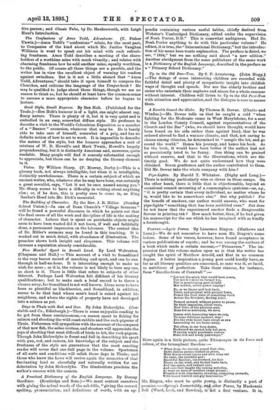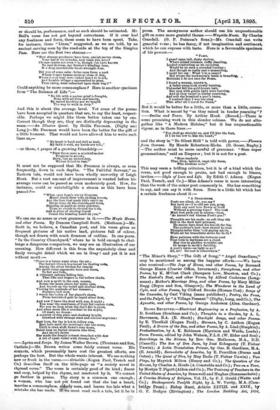POETRY.—Lyric Poems. By Laurence Binyon. (Mathews and Lane.)—We do not
remember to have seen Mr. Binyon's name before. Some of his verses, however, have found acceptance in various publications of repute ; and he was among the authors of a book which made a certain success,—" Primavera." _ The im- pression that this volume makes upon us is that the writer has caught the spirit of Matthew Arnold, and that in no common degree. A better inspiration a young poet could hardly have, as far as all literary qualities are concerned, so sane was it, so lucid, so ambitious of perfection. Take these stanzas, for instance, from "Recollections of Cornwall"
Lecnot the mind, that would have peace, Too much repose on former joy, Nor in pourtraying past delight Her needed, active power employ!
So, as we linger and look back, Tired, and perplext with present fears, Comes the clear voice of something stern Across the frivolous, fleeting years.
Pressed onward, without power to pause, By their imperious, silent wave, How little of the precious past, Hoarded so anxiously, we save.
Scarce with beseeching tears we cry, To some delicious moment, stay I Ere the rude hours have swept us on t Lamenting we are borne away.
Yet often, in our deep desire, Backward we cannot help but gaze, If gazing might perchance restore Some lost and lovely yesterdays."
Here again is a little picture, quite Titianesque in its force and colour, of the triumphant Bacchus :- " When from the storied, sacred East afar, Down Indian gorges clothed in green,
With flower-reined tigers and with ivory car He came, the youthful god ;
Beautiful Bacchus, ivy-orowned, his hair
Blown on the wind, and flushed limbs bare, And lips apart, and radiant eyes, And ears that caught the coming melodies, As wave on wave of revellers swept abroad ; -
Wreathed with vine-leaves, shouting, trampling onwards,
With tossed timbrel and gay tambourine."
Mr. Binyon, who must be quite young, is distinctly a poet of promise.—Spring's Immortality, and other Poems, by Mackenzie Bell (Ward, Lock, and Bowden), is not a first venture, It is,
" When open hope's staery blossoms March winds blow with chilling breeze, And the face that made life's sunsh ne Sleeps bone ith the churchyard trees, Standing straight at every gateway, Thun.ler clouds to shroud the blue, And In place of circling laurel
Comes the treading heart on yon."
We can see no sense or even grammar in it.—The Magic House, and other Poems. By Duncan Campbell Scott. (Methuen.)—Mr. Scott is, we believe, a Canadian poet, and his verse gives us frequent pictures of his native land, pictures full of colour, though not drawn with much firmness of outline. In one poem, "In the Country Churchyard," where he is bold enough to chal- lenge a dangerous comparison, we may see an illustration of our meaning. How different is this from the exquisitely clear and finely wrought detail which we see in Gray ! and yet it is not without merit
"There is a honey scent along the air ;
The hermit thrush has tuned his fleeting note,
Among the silver birches far remote His spirit voice appeareth here and there, To fail and fade, A visionary cadence falling fair, That lifts and lingers in the hollow shade.
And now a sprit in the east, unseen, Raises the moon above her misty eyes, And travels up the veiled and starless skies, Viewing the quietude of her demesne; Stainless and slow, I watch the lustre of her planet's sheen, From burnished gold to liquid silver flow.
And now I leave the dead with you, 0 night ;
Yon wear the semblance of their fathomless state, For you we long when the day's fire is great, And when stern life is cruellest in his might, Of death we dream: A country of dim plain and shadowy height, Crowned with strange stars and silences supreme:
Rest here, for day is hot to follow you,
Rest here until the morning's star has come, Until is risen aloft dawn's rosy dome, Based deep on buried crimson into blue, And morn's desire Has made the fragile cobweb drenched with dew A net of opals veiled with dreamy fire."
—Lyrics and Songs. By James Walter Brown. (Thurnam and Son, Carlisle.)—Mr. Brown writes some fairly correct verse. His sonnets, which presumably have cost the greatest efforts, are perhaps the best. But the whole wants interest. We see nothing new or fresh in the verse.—Griselda (Kogan Paul, Trench and Co.) describes itself on the title-page as "a society novel in rhymed verse." The verse is certainly good of its kind ; fluent and easy, helped by the rhyme, not mastered by it. We cannot go further in praise. The story is a common one enough ; a woman, who has not yet found out that she has a heart, marries a commonplace, elderly man, and learns too late what a mistake she has made. If -we must read such a tale, let it be in
or should be, performance, and as such should be estimated. Mr. Bell's verse has not got beyond correctness. If it ever had any freshness and force, these seem to have been spent. Take, for instance, these " Lines," suggested, as we are told, by an ancient carving seen by the road-side at the top of the Simplon Pass. Here are the first two stanzas :—
" How strange perchance have been, quaint carven stone,
Your harsh viessitudes, how came you here? Ching° spares not even vein, though you have known No soul-distress, nor Sorrow's blinding tear, r deep unutterable heart-wrought fear.
Did you of some calm shrine once form a part Where vesper hymns arose at close of day, Where lovers trim were linked heart to heart, And bumble villagers approached to pray, Then rising, went refreshed upon their way ?"
Could anything be more commonplace P Here is another specimen from " The Balance of Life ":—
"No life with ceaseless grief is fraught, None with all bliss and beauty,
By varied teaching are we taught The way to walk in duty."
And this is about the average level. Yet some of the poems have been accepted in quarters that are, to say the least, respect- able. Perhaps we might like them better taken one by one. Correct though they are, they are distinctly depressing in the mass.—An Illusive Quest. By Hollis Freeman. (Digby and Long.)—Mr. Freeman would have been the better for the gift of a little humour. That would not have allowed him to write such lines as,—
" My heart is bard and dull as lead, My faith is cold, my hands are red ;"
—or these, a propos of a growing friendship :—
" Pint there came a mischief-maker
Progress to arrest; Envy, like an undertaker, Wished it laid to rest"
It must not be supposed that Mr. Freeman is always, or even frequently, down in such depths. " The Faithful Servant," an Eastern tale, would not have been wholly unworthy of Leigh Hunt. But a vast amount of improvement is wanted before his average verse can be passed as even moderately good. How, for instance, could so unintelligible a stanza as this have been passed ?— prose. The anonymous author should use his unquestionable gift on some more grateful theme.—Wayside Music. By Charles Crandall. (G. P. Putnam's Sons.)—Mr. Crandall can write graceful verse ; he has fancy, if not imagination and sentiment, which he can express with taste. Here is a favourable specimen of his powers :—
" Pamir.
I gazed upon tall, dusty shelves,
Where gilded volumes, stiffly standing, Looked comfortless as we ourselves Would be on such a crowded landing ; And though so costly and commanding, I could but say : What 's in a name? Hid where the bookworm's tooth is branding, Methinks I do not care for Fame.
I found a woman, nnawa-e,
A faded scrap-book slowly turning, Unheeded fell the gold-brown hair, Her eyes with gentle light were burning. And as they raised in tender yearning, And soft she breathed a poet's name, I realised that I was leaning That after all I cared for Fame."
-
But it would be better for a little, or more than a little, correc- tion. What is meant by "as they raised in tender yearning " ? —Smiles and Tears. By Arthur Hood. (Record.)—There is some promising work in this slender volume. We do not alto- gether like " A Modern Heloise," but it has unquestionable vigour, as in these lines :— " Yon shall go straight on, and I'll kiss the foot, If I lie too low to kiss the hand ;"
and the story in "Be Silent Still" is told with power.--Flowers from Oversea. By Maude Robertson-Hicks. (G. Gooer, Rugby.) —The author must be more careful of grammar. " Sum super grammaticam," said an Emperor ; but it is not for a poet.
"More tenderly Than thou, beloved, cant idly deem, Who heedless seem."
This may seem a trifling criticism, but it is of a kind which the verse, not good enough to praise, not bad enough to blame, invites. Idyls of Love and Life. By Edith C. Adams. (Began Paul, Trench, and Co.)—Miss Adams's verse is more interesting than the work of the minor poet commonly is. She has something to say, and can say it with force. Here is a little bit which has a certain freshness about it :—
" A onazzznon.
Poets are silent, sir, you say ? But hark ye—I would ask you, pray, Doth any seed boar flower or fruit
Without a growing time ? The root Must first push out in silence—then. 'As Aaron's rod blooms Poet's pen!'
Thoughts are his seeds : so soft they stir Still in the dark held prisoner,
He scarce dare draw his breath for tea;
The embryo's lost—how should he steel Thought-laden then 'mid gaping mirth, While all his branchleta strive for birth?
Have patience with the tortuous root That toils in darkness ere a shoot
May rise to gladden watchful eye
Or merge in earth's fertility, A poet's verse—as light as air ? Ah, air! Its root is otherwhere."
" The Miner's Story," " The Gift of Song," " Angel Guardians," may be mentioned as among the happier efforts.—We have also received :—The Joys of Home, and other Poems, by Bernard George Hoare (Courier Office, Inverness); Persephone, and other Poems, by K. M•Cost Clark (Sampson Low, Marston, and Co.) ; The Kestrel's Nest, and other Verses, by Alfred Cochrane (Long- mans) ; Mother's Marriage Ring, and other Poems, by Mary Millar Begg (Bryce and Son, Glasgow); The Wanderer in the Land of Cybi, and other Poems, by Clifford Brooks (Horace Cox) ; Songs of the Cascades, by Carl Viking (same publisher) ; Poetry, the Press, and the Pulpit, by "A Village Peasant" (Digby, Long, and Co.); The Agnostic, and other Poems, by George Anderson (Alex. Gardner).



































 Previous page
Previous page